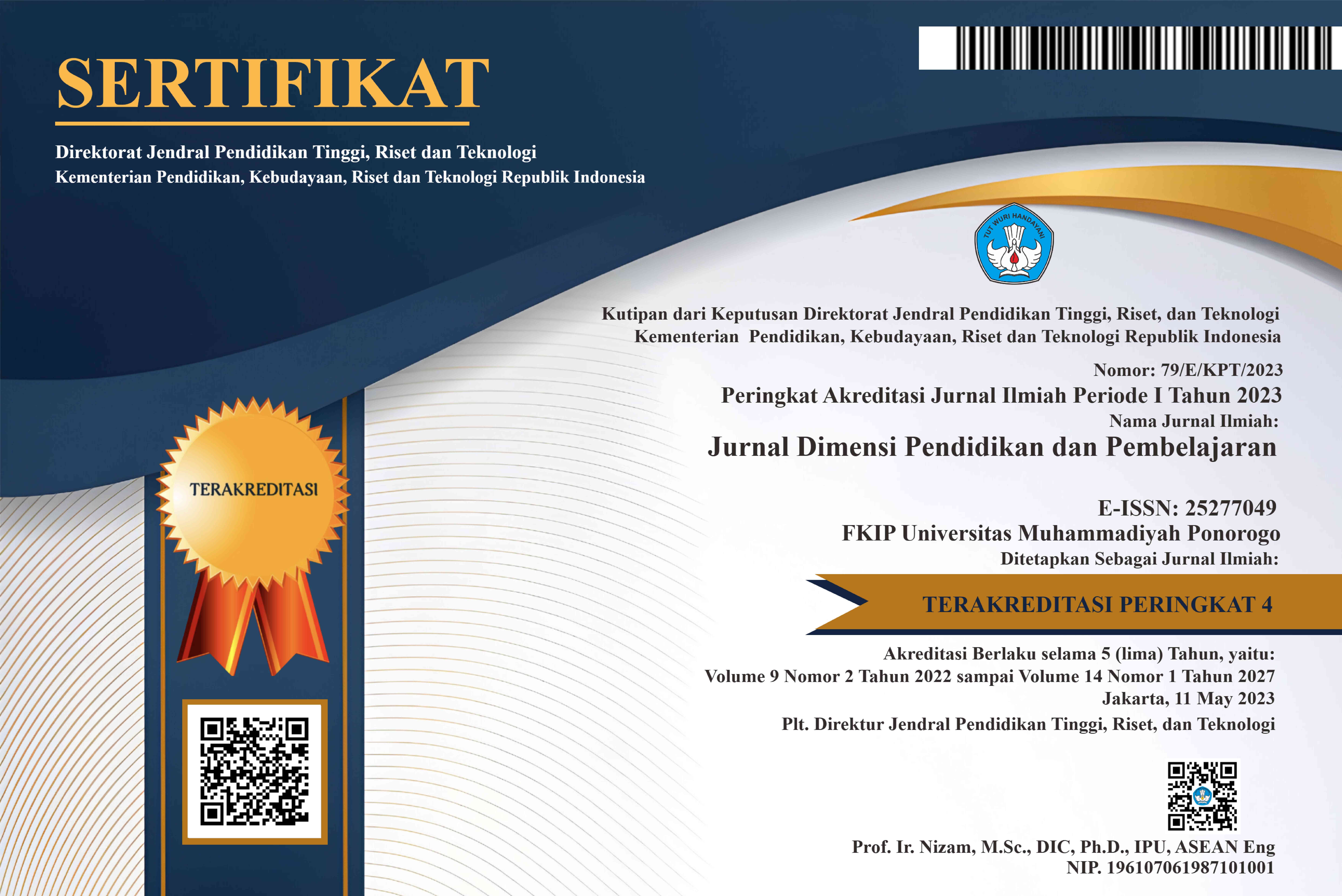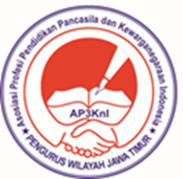Character Formation Habituation in P5 as Co-Curricular Based Learning in Surakarta City Schools
DOI:
https://doi.org/10.24269/dpp.v13i0.11405Abstract
One of the educational transformations in the current era is emphasized on the formation of student character. Internalization of character in students can be formed through the P5 program. The P5 program is an initiative designed to integrate Pancasila values into project-based student character education. In character development, character formation habits are needed which include habitus, capital, arena, and practice. The aims of this research is to examine the habituation of student character formation through the P5 program theme in educational units. Qualitative method with a case study-based approach is used in this research. Data collection techniques in this study used interviews, observations, and document analysis. This study was conducted at three school levels with the aim of comparing the implementation patterns of character formation in the P5 program on students at SD Negeri Joglo No. 76 Surakarta, SMP Negeri 1 Surakarta, and SMA Batik 1 Surakarta. The Miles, Huberman, and Saldana models, namely data reduction, data presentation, and drawing conclusions is used to analyse data. The data findings in this study indicate differences in the implementation process of the P5 program at three levels of schools in Surakarta City and that habituation is needed in internalizing the six dimensions of the Pancasila student profile based on the P5 project.
References
Amaruddin, H., & Hamdan Tri Atmaja, M. K. (2020). THE ROLE OF FAMILY AND SOCIAL MEDIA IN FORMING STUDENTS' POLITE CHARACTER IN ELEMENTARY SCHOOLS. Character Education Journal, 1, 89.
Asiati, S., & Hasanah, U. (2022). Implementation of the Pancasila Student Profile Strengthening Project in the Driving School. Journal of Education Quality Circle, 19(2), 61–72. https://doi.org/10.54124/jlmp.v19i2.78
Aulia, D., Hadiyanto, & Rusdinal. (2023). Analysis of Independent Curriculum Policy Through the Implementation of the Pancasila Student Profile Strengthening Project in Elementary Schools. Journal of Elementary School Thought and Development (JP2SD), 11(1), 122–133. https://doi.org/10.22219/jp2sd.v11i1.25923
Damayanti, I., & Al Ghozali, M. I. (2023). Pancasila Student Profile Strengthening Project as a Co-curricular Program in Elementary Schools. Jurnal Elementaria Edukasia, 6(2), 789–799. https://doi.org/10.31949/jee.v6i2.5563
Gunawan, D. M. R., & Suniasih, N. W. (2022). Profile of Pancasila Students in National Defense Efforts in Grade V Elementary Schools. MIMBAR PGSD Undiksha, 10(1), 133–141. https://doi.org/10.23887/jjpgsd.v10i1.45372
Ilmiah, N., & Marzuki, I. (2023). Analysis of the Pancasila Student Profile Strengthening Project in Increasing Entrepreneurial Spirit in Phase B Students of UPT SD Negeri 40 Gresik. Journal of Education, Social and Religious, 20(683–693).
Irawati, D., Iqbal, A. M., Hasanah, A., & Arifin, B. S. (2022). Pancasila Student Profile as an Effort to Realize National Character. Edumaspul: Journal of Education, 6(1), 1224–1238. https://doi.org/10.33487/edumaspul.v6i1.3622
Irsad Rusdiani, N., Setyowati, L., Putri Agustina, N., Nurleha, & Januar Mahardhani, A. (2023). Strengthening Morals and Religion of Early Childhood Through the Habit of Dhuha Prayer at Pembina Ponorogo State Kindergarten. Journal of Educational and Learning Dimensions, 11(1). http://journal.umpo.ac.id/index.php/dimensi/index
Ismelani, N., Mahmudah, R., & Rosmaladewi, O. (2023). Implementation of the Independent Curriculum in Realizing the Pancasila Student Profile Through the Tatanen Program at Bale Atikan, Purwakarta Regency. Islamic Education Journal, 5(1), 15–25.
Khakim, H. M., & Imron, A. (2019). Habituation of Adolescent Reproductive Health Education. Journal of Chemical Information and Modeling, 53(9), 1–6.
Khasanah, V. A., & Muthali’in, A. (2023). Strengthening Critical Reasoning Dimensions through Project Activities in the Independent Curriculum. Journal of Education and Learning Dimensions, 11(2). http://journal.umpo.ac.id/index.php/dimensi/index
Maudyna, I. E., & Roesminingsih, E. (2023). Evaluation of Educator Readiness in Implementing the Pancasila Student Profile Strengthening Project (P5). Journal of Education and Learning, 4, 637–648.
Mery, M., Martono, M., Halidjah, S., & Hartoyo, A. (2022). Student Synergy in the Pancasila Student Profile Strengthening Project. Basicedu Journal, 6(5), 7840–7849. https://doi.org/10.31004/basicedu.v6i5.3617
Nadila, R., & Aeni, K. (2023). Implementation of the Pancasila Student Profile of Grade IV Students of Randugunting 7 Elementary School, Tegal City. Journal of Elementary Education, 12(1), 1–9.
Putri Abadi, D., Hidayah, N., & Hatifah, Y. (2024). Portrait of Evaluation of the Guidance and Counseling Program in the Field of Learning at SMP Brawijaya Smart School Malang. Journal of Educational and Learning Dimensions, Special Issue. http://journal.umpo.ac.id/index.php/dimensi/index
Putrie. Halimah Stephany, Khairul Basyar, Moh. A., & Asri Untari, M. F. (2023). Implementation of Pancasila Student Profile in P5 Learning of Grade IV Students of SDN Bandungrejo 2, Demak Regency. Didactic: Scientific Journal of PGSD STKIP Subang, 9(2), 2472–2486. https://doi.org/10.36989/didaktik.v9i2.933
Rahma, M., & Amrullah, M. (2024). Analysis of the Implementation of the Pancasila Student Profile Strengthening Project on the Religious Attitudes of Elementary School Students. Journal of Dimensions of Education and Learning, 12(Special Issue). http://journal.umpo.ac.id/index.php/dimensi/index
Septiana, A., & Fauzi, A. M. (2022). HABITUS OF TOLERANCE IN BUDDHIST EDUCATION AT MAHA VIHARA MAJAPAHIT TROWULAN. Journal of Buddhism and Science, 7(2), 163–171.
Sufyan, Q. A., & Ghofur, A. (2022). Utilization of Educational Digitalization in Developing Student Character. MUBTADI: Journal of Elementary Education, 4(1), 62–71. https://doi.org/10.19105/mubtadi.v4i1.6531
Sulistiawati, A., Khawani, A., Yulianti, J., Kamaludin, A., & Munip, A. (2023). Implementation of Pancasila Student Profile through Local Wisdom-Based Projects at Trayu State Elementary School. Fundadikdas Journal (Fundamentals of Elementary Education), 5(3), 195–208. https://doi.org/10.12928/fundadikdas.v5i3.7082
Sutrisno. (2023). Global-Conscious Citizenship Education for Cultivating Learning Skills and Innovation of 21st Century Citizens. Journal of Education and Learning Dimensions, 11(1). http://journal.umpo.ac.id/index.php/dimensi/index
Waruwu, M. (2023). Educational Research Approach: Qualitative Research Method, Qualitative Research MethodWaruwu, M. (2023). Educational Research Approach: Qualitative Research Method, Quantitative Research Method and Mixed Method. Bhineka Tunggal Ika: Study of Theory and Practice of Civic Education, 7(1), 2896–2910. https://doi.org/10.36706/jbti.v9i2.18333
Yunazar, R., Aranssy, A. P., Utami, D. P., Irsandhi, M. M., & Al Karimah, W. (2024). Adaptation Strategy of P5 Program in Character Formation of Students in Surakarta City. Niara Journal, 16(3), 467–478. https://doi.org/10.31849/niara.v16i3.18116
Downloads
Published
Issue
Section
License
Copyright
Authors who publish their manuscripts in this journal agree to the following terms:
- The copyright on each article belongs to the author.
- The author acknowledges that Jurnal Dimensi Pendidikan dan Pembelajaran has the right to be the first to publish under a Creative Commons Attribution 4.0 International (Attribution 4.0 International CC BY 4.0) license.
- Authors may submit articles separately, arranging for the non-exclusive distribution of manuscripts that have been published in this journal to other versions (e.g., sent to the author's institutional repository, publication into books, etc.), acknowledging that the manuscript was first published in the Jurnal Dimensi Pendidikan dan Pembelajaran.
Â
License
Use of the article will be governed by the Creative Commons Attribution license as currently published under the Creative Commons Attribution 4.0 International License (Attribution 4.0 International (CC BY 4.0).
Â
This license permits anyone to copy and redistribute this material in any form or format, compose, modify, and make derivatives of this material for any purpose, including commercial purposes, as long as they give credit to the author for the original work.


_001.jpg)



